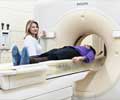New research presented at the annual meeting of the Radiological Society of North America shows computed tomography scans may accurately detect small cancers and stones in the kidneys, bladders and urinary tracts of high-risk patients.
Multi Detector CT Urography ( MDCTU ) scans can be performed using helical CT scanners, which pass X-rays through the body from different angles. Patients are given a contrast dye that allows the scanner to make detailed images of the entire urinary system in slices smaller than a millimeter thick. Computers then combine these slices to create images that can be viewed.Researchers from the University of Michigan studied the ( MDCTU ), to determine if the technology can accurately detect small kidney, bladder, and urinary masses. Results of the study show the MDCTU scan detected 93 percent of urinary system cancers in the 65 patients studied. Researchers say MDCTU can spot numerous problems in the tiny vessels of the urine collection system and also detect bladder cancer and kidney stones.
Intravenous pyelogram (IVP) is the traditional method used to detect these problems but it identifies the cause of symptoms less than 50 percent of the time. IVPs also tend to have high false-positive and false-negative rates.Researchers say, their experience to date with MDCTU in patients with prior bladder and urinary tract cancer has convinced them that it is as good as IVP -- and probably far better -- for detecting all abnormalities of the urinary system.
According to the MDCTU study specialists were able to spot subtle tumors as small as two millimeters to three millimeters in areas where other investigation cannot go. They say MDCTU also saves patients from having to endure repeated diagnostic scans and procedures.
Thus researchers say they hope that MDCTU can become the first and only imaging test used for evaluating high-risk patients with urinary system symptoms, and that it will soon allow patients everywhere to get accurate early diagnoses that might improve their outcomes.











